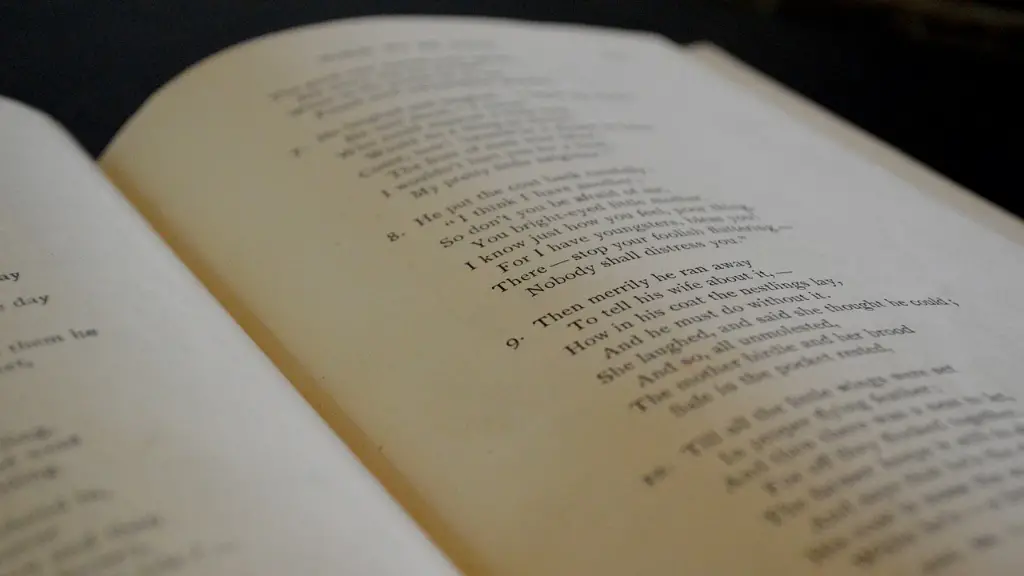Early Life of Shakespeare and His Background in Poetry
William Shakespeare was born in Stratford-upon-Avon in 1564. He was baptised and likely educated in the local grammar school, although we know very little of his childhood. By 1582, he had married Anne Hathaway and they had three children. Around 1586, he began to work as an actor and playwright in London, appearing in several collaborations and some of his early works were performed by the Lord Chamberlain’s Men.
It is not known exactly when Shakespeare began writing poetry, but it is believed that his earliest poem was Venus and Adonis, which was published in 1593. This poem was nothing like the works of the other Elizabethan writers at the time, as it focused in detail on sensual themes. This marked the beginning of Shakespeare’s reputation as a daring and innovative poet.
The first collection of Shakespeare’s poems and sonnets rose in popularity in 1594, when satire, satire and pastoral aspects were in vogue. The second edition of the book was released in 1609, and contained more published poems than the first edition, including The Phoenix and the Turtle, A Lover’s Complaint, and some sonnets from the previous 16th century.
Shakespeare’s works challenged the traditional Petrarchian ideal of love. He chose to use Petrarchan conceits and explore the complexities of both physical and spiritual love, while also experimenting with different content, styles and forms. Through his poetic works, he explored his innermost feelings and fears, treating both comedy and tragedy in a sensitive and passionate way. Shakespeare was revolutionary for his time, introducing the idea of a “dark lady” into his works, providing the audience with a more intense, turbulent vision of love.
Shakespeare had a great understanding of the human body, and used this knowledge to create vivid multidimensional characters. His sonnets, which often tell stories of betrayal, lust and heartbreak, are characterized by metaphysical conceits, comparing abstract concepts to physical objects. He expertly creates language that is accessible and yet simultaneously innovative, drawing upon classical, biblical and mythical sources to create deeper meaning.
By 1598, Shakespeare had become a well-established playwright and poet. His works began to focus more on tragedy, such as Romeo and Juliet and Macbeth, and his later works often featured a strong sadness and a melancholic tone. His work was celebrated in his lifetime, and he was often praised for his understanding of the complexities of love, his unique insight into human nature, and his skillful use of language.
Influence of Shakespeare’s Poetry
Today, hundreds of years after Shakespeare wrote his works, his poetry still continues to influence and inspire writers from all walks of life. Shakespeare was one of the first writers to explore the darker sides of subjective experience, and this willingness to challenge and push boundaries bring his works to life for a contemporary audience. His works are full of passion and emotion, and have the power to move and transform people.
Shakespeare’s influence is also seen in modern popular culture, as his works have been adapted and referenced countless times. Many of his characters and stories have been used in art, music and film, and his work has been rewritten under contemporary contexts and settings to create new and exciting forms of expression. His works continue to captivate audiences and bring people together.
There are also literary movements that sprang out of the influence of Shakespeare’s works. These include the English Romantic Movement, which focused on capturing the beauty and truth of nature and emphasizing emotion over reason, and the Neoclassical Movement, which emphasized archaisms, wit and rationality. New adaptations and interpretations of Shakespeare’s works are still being created today, as generations of writers, actors, directors and producers are given a unique platform to tell their story in Shakespeare’s words.
Analysis of Shakespeare’s Poetry
Shakespeare was an exceptionally talented and innovative poet, who was not afraid to deviate from the traditional Petrarchan ideals of love and explore more intense and turbulent aspects. His language and poetic structure is still studied and revered today, and his influence has had a lasting impact on literature, art, music and culture.
Shakespeare’s works challenged the accepted conventions of his time with his bold and unflinching exploration of human nature and experience. His brilliant word choice, imagination, and complex themes paint beautiful and powerful portraits of love, tragedy, and heartbreak that still resonate today. His works are almost universally recognised and admired, and his influence is still evident in contemporary literature and popular culture.
Comparison with Other Elizabethan Poets
In comparison to other Elizabethan poets, Shakespeare was innovative and daring with his works, choosing to use bold language to explore more taboo topics that resonated with his audience. His use of language and structure was highly complex and often layered with meaning, and his works shifted from comedy to tragedy in ways that changed the way Elizabethan society viewed love.
Unlike his contemporaries, Shakespeare was not afraid to explore the less favourable aspects of human nature and experience. He pushed boundaries and created characters that reflected the complexity of human emotion, and he challenged the traditional sensibilities of the time. This willingness to express himself in new and different ways gave Shakespeare’s works a raw, edgy quality that still captivates audiences today.
Shakespeare also shifted the paradigm of Elizabethan sonnets, as he moved away from the strict Petrarchan ideal of love that was prevalent at the time. His use of imagery and metaphor was highly advanced, providing the audience with a vivid expression of passion, heartache, and tragedy. His sonnets were passionate, intense, and deeply meaningful, creating a new and exciting performance style that was accessible and fresh.
Criticism of Shakespeare’s Poetry
Critics often argue that some of Shakespeare’s works rely too heavily on stock characters and cliches, and that his works lack the critical examination that many of his contemporaries were known for. There have also been some criticisms of his use of language, as many claim that his works are too clichéd and romanticized.
Another criticism of Shakespeare’s works is that he often glossed over the potential implications of his poetry, such as the issue of gender roles or the glorification of violence. Some argue that while his works are emotional and thrilling, they ignore the realities of the times by romanticizing the stories.
Regardless of the criticisms, there is no doubt that Shakespeare’s works have become some of the most studied and performed plays in world literature. His skillful use of language, his willingness to explore difficult themes, and his innovative approach to love and tragedy have stood the test of time, and continue to captivate audiences of all ages today.
Legacy of Shakespeare’s Poetry
The legacy of Shakespeare’s poetry is evident in all aspects of modern culture, from art and music to television and theatre. His influence can still be seen in contemporary literature, as stories of love and loss, passion and heartbreak are often told using Shakespeare’s words. His vivid imagery and innovative language continues to inspire writers, performers and artists everywhere.
Shakespeare’s works have changed the way we perceive and experience love, and his characterisations and plotlines are still beloved both in the theatre and in popular culture. His works often feature a mixture of both comedy and tragedy, reflecting the complexity of the human experience. Shakespeare has left a lasting impact on the way we think, feel, and express ourselves, and his works continue to captivate audiences of all ages.
Shakespeare’s poetry is timeless and truly revolutionary. His works are unique, powerful, and incredibly moving, and have paved the way for generations of writers and performers to create new interpretations and adaptations of his works. His legacy is undeniable, and his influence will continue to be felt for centuries to come.





